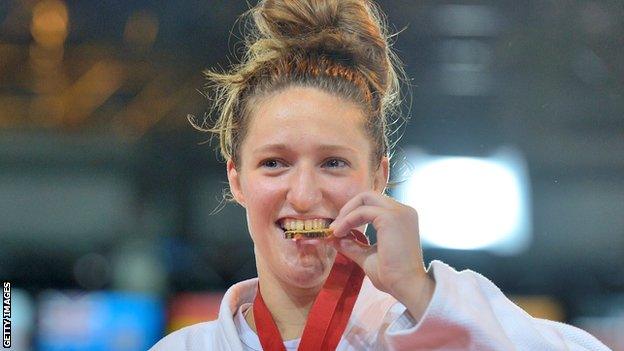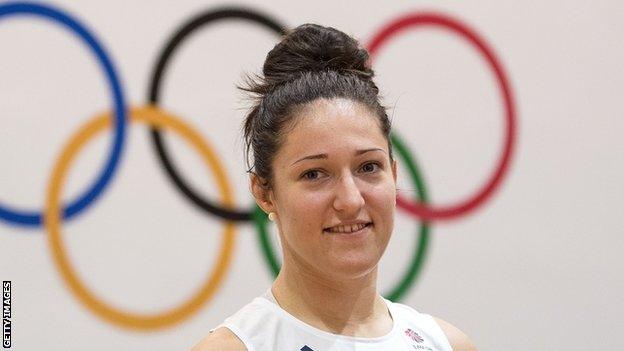Natalie Powell: 'If speaking openly will help, that's something I should do'
- Published

Natalie Powell won Commonwealth Games gold in Glasgow eight years ago
Looking at Natalie Powell's Instagram post about her first Pride, two things jump out: rainbows and smiles.
Sporting a multicoloured headband and with a Welsh dragon painted on her cheek, the former Commonwealth judo champion is clearly having a ball.
She isn't there alone either, with fellow athlete Osian Jones also enjoying his first Pride since sharing his story with the BBC earlier this year.
"We went for a bottomless brunch," Powell says. "I met a few of his friends, he met a few of mine. It was just really fun.
"I'd never thought about what it would be like to just be comfortable with myself with no insecurities. I suppose I didn't really think it would be possible - but it is, and here we are."
Powell, like Jones, has been on a journey when it comes to accepting her sexuality.
Now she has decided to speak to the BBC's LGBT Sport Podcast about her experiences - in the hope of helping others.
Allow Instagram content?
This article contains content provided by Instagram. We ask for your permission before anything is loaded, as they may be using cookies and other technologies. You may want to read Meta’s Instagram cookie policy, external and privacy policy, external before accepting. To view this content choose ‘accept and continue’.
'Wow, this is ridiculous'
When it comes to judo success, Powell was something of a late developer.
"It was quite funny, because when I was younger I used to get beaten by quite a few of the girls," the 31-year-old remembers.
"Mostly, I was second or third until I was in the late juniors age group, but as soon as I started beating them, they'd quit.
"My mum and I had a running joke, because it was a list of about 10 or 12 who stopped in the end, thinking: 'Oh well, it's time to quit - we've got no hope if Natalie's beating us!'"
Once the victories came, they rarely stopped - and it wasn't long before Powell was winning medals at competitions around the world, including a historic gold at her first Commonwealth Games in Glasgow in 2014.
"I can still remember the moment you step in front of the crowd at the opening ceremony," she says with a smile.
"It's a muffled noise when you're standing outside, and then you go in and it's just like: 'Wow, this is ridiculous.'"
'If anyone had ever asked if I'm gay, I think I'd have shrivelled up inside'
Powell made her Olympic debut at Rio 2016 - but if things in her sporting life were going from strength to strength, her personal situation was a different story.
"I really struggled with coming to terms with my sexuality," she says.
"I probably knew I was gay when I was about 18, but I didn't want to accept it and thought I could force myself to be attracted to men.
"When I was at university, it wasn't such an issue, as all my friends were going out partying and enjoying themselves. But as people started to settle down, you go home and your friends ask if you've got a boyfriend yet… and the more it went on and I was still not with a boyfriend, those comments start to eat away at you."
Powell says she started to avoid social situations because she didn't want to be asked - but also didn't want to lie.
"I'd be skirting around things without actually saying it," she says. "If anyone had ever asked me 'Oh, are you gay?' I think I'd have just shrivelled up inside and thought: 'Oh my God, they think I'm gay!'"

Powell was beaten in the quarter-finals at the Rio Olympics
'I told my friends and family, and within six months I felt like another person'
Judo became more than just a sport Powell was excelling in; it became a place to block out the pain she was feeling inside.
"I was using it as an escape for a lot of it," she says.
"When I was feeling down or thinking about it, I just focused on judo. I thought if I did well at it, everything would be OK. I'd settle down with a family after, find a boyfriend, everything would be OK.
"I got to the point where I'd achieved stuff in judo that I thought was going to be the pinnacle, and then, actually, I really wasn't happy.
"It was probably the saddest I'd ever been. Every other aspect of my life was in a good place, and that was the one thing that was holding me back. I had to deal with it, but I couldn't bring myself to tell anyone."
Eventually, the pain of holding on to her secret became too much for Powell - and two weeks before her 27th birthday, she broke down.
"I was living with one of my really close friends and I came out to her," she remembers.
"She was fantastic - and from there, things instantly got better. I told my friends and my family, and within six months I felt like another person. I just wish I'd been able to come to terms with it sooner, as I put myself through unnecessary pain."
'Hearing from other people who've been through similar experiences really helped'
With just days to go until the start of the World Judo Championships in Tashkent, life has been busy for Powell.
Training camps have meant the two-time Olympian hasn't had much free time - and one of her favourite activities is off the menu until after the championships.
"I do love a coffee and cake with friends, but not so much cake at the moment," she says, before momentarily reconsidering. "Although I am a bit light for my weight at the moment, so I could have a cheeky bit of cake on the side."
Despite her schedule, Powell is keen to make sure her story is known.
"All my friends and family are completely fine with it, and I knew they would be," she says.
"But to imagine other people who have people that are going to isolate them from the family if they come out… I can't get my head round how hard it must be.
"I know that listening to podcasts or reading about other people who've been through similar experiences really helped me, and I felt an affinity and connection to them.
"I'm not one to be waving the flag everywhere, but if I can just speak openly about my experiences, knowing I'm going to help people… it feels like it's something I should do."
Natalie Powell was speaking to Jack Murley on the BBC's LGBT Sport Podcast. Hear new episodes every Wednesday on BBC Sounds.

Is cooking food in an air fryer 'healthier'?: Sliced Bread grills a food scientist and the BBC's Good Food Magazine to find out
The champion ignored by the world: Meet Ora Washington, who fought to make her name in racially segregated America
